Enemies, later friends, always rivals: Saturday’s European Champions Cup final is the latest chapter in the Ronan O’Gara/Johnny Sexton story, one that began in bitterness and remains as intriguing as ever.
PART ONE: THE SCREAM
LONG BEFORE HIS CENTURY of caps, his winning drop-goal in Paris, his world player of the year award, his grand slam, his European Cups, his Lions tours, Johnny Sexton was a nobody wanting to be a somebody.
“Who are you?” Ronan O’Gara reportedly said to him, the first time they shared a pitch, and an argument.
Within a month, he’d find out. Munster were defending European champions, Leinster the bridesmaids widely tipped to become spinsters. Twenty-five minutes in, their playmaker went off, an ashen-faced 23-year-old sent on as a replacement, his first job to kick a 30-metre penalty. Actually, that was his second job. His first was to ask the bagman to find his kicking tee.
Thirty seconds elapsed before Johnny O’Hagan, the bagman, returned, enough time for Jonathan Sexton to decide if he wanted to turn into someone else. That was when Jonathan became Johnny, when his personality got spiked with attitude, when he didn’t think twice about following Gordon D’Arcy into the left corner a few minutes later, celebrating the centre’s try with a scream into O’Gara’s face.
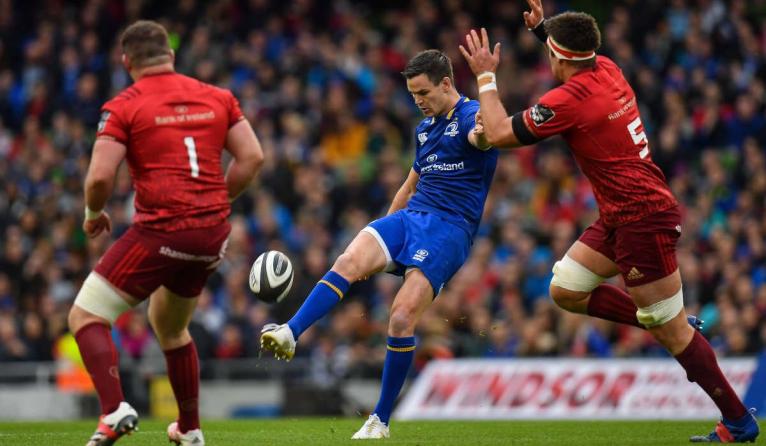
“That was him announcing to the world, ‘I’m here and I’m here to stay’, wrote O’Gara in his autobiography.
“The only thing I actually said was ‘Yes!’ but I just directed it at him and the picture got it probably at the very worst split-second,” Sexton said a couple of weeks afterwards. “I regret it now, for the hassle it caused. I got a letter from a Munster fan, with a picture attached of me shouting and telling me how unsportsmanlike I was. I regret it, because I have family in Kerry and Limerick.”
The bigger regret, though, would have been if there had been no scream, no appearance off the bench, no opportunity to let O’Gara know who he was. For that scream had little to do with Johnny Sexton’s relationship with Ronan O’Gara and much more to do with his relationship with himself.
THREE months earlier, Wasps welcomed Leinster to Twickenham, for the sixth round of that season’s Heineken Cup pool stages. Sexton didn’t make the travelling squad. Instead he lined out for his club, St Mary’s, against Garryowen in the All-Ireland league. Templeville is no Twickenham. When the rain falls you have two choices, get wet or get yourself to the clubhouse. That latter option was the one everyone, bar the players, subs and three officials made that day.
It was the lowest point of my career to that stage. It wasn’t nice at the time and that was the point where I thought: ‘That’s it. Leinster’s finished for me
Sexton on Michael Cheika’s decision to bench him.
If that hit him hard then a half-time substitution in December, against Castres, hit harder.
“It was the lowest point of my career to that stage,” he’d later say of Michael Cheika’s decision to bench him. “It wasn’t nice at the time and that was the point where I thought: ‘That’s it. Leinster’s finished for me.’ It was just: ‘Felipe (Contepomi) you’re on, Johnny you’re off.'”
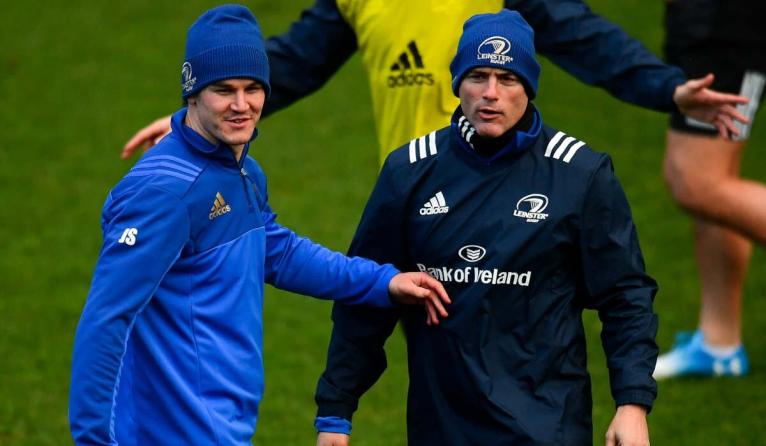
This is how close the Johnny Sexton story came to ending. Had he left Leinster that spring, there’d have been no European Cup, no drop-goal to win a Six Nations opener in the Stade de France, no Lions tour, no rivalry with O’Gara.
“I was pissed off about being subbed,” he’d tell The Sunday Independent at the end of that 2009 season, “and I wanted to show them that I was pissed off and they picked up on it. Me and Cheiks sat down and had a talk and he explained his position, and I took it on board. I didn’t really play much for the month or two after that.”
He could have left. Two French clubs wanted him, one English one. But something scared him. What if he did go and Leinster went on to replace Munster as European champions? Could he live with that decision? “To be born and bred in Leinster and not be part of it. That was one thing that spurred me on. That’s what made me work harder when things weren’t going well.”
So he stayed. He landed that kick against Munster, was there when the baton passed from one province to another and was there when Declan Kidney, the then Ireland coach, decided that November that it was time for another change of the guard. O’Gara, a mainstay in the team for nearly a decade, was out, Sexton in. The rivalry had truly begun.
PART TWO – ENEMIES
Sexton was 24 when he won his first cap, O’Gara 32. Just eight months earlier, O’Gara had dropped the winning goal to land Ireland their first grand slam in 61 years. He’d also been on three Lions tours, had played in over 90 Tests, had won two Heineken Cups. Kidney, the Ireland coach, taught him at school, worked with him in Munster. But still he dropped him.
Remembering that Sexton scream into O’Gara’s face, the RTÉ production team sensed drama and began a practice of zoning a camera in on O’Gara whenever Sexton lined up a kick.
“They (RTÉ) seem to be good at stirring it up,” Sexton smiled, when asked about the burgeoning rivalry in a 2011 interview.
If there were three of us there, one of us could sit in the front, one in the back, and we wouldn’t even have to look at each other.O’Gara on his uneasy relationship with Sexton
“When we were forced to room-share, I don’t even think he stayed overnight,” wrote O’Gara in his book, Unguarded. “He may have the first night but the second night he was gone.”
They simply didn’t like one another back then. O’Gara tells a story in his autobiography about the tense silences on the drive back to the team hotel after kicking practice. “If there were three of us there, one of us could sit in the front, one in the back, and we wouldn’t even have to look at each other.”
Hopes of a ceasefire appeared futile. “Even the pope,” O’Gara wrote, couldn’t have brought peace.
It’s easy to understand why. Sexton had what O’Gara wanted. Worse again, he had the thing he used to own. Now it was gone and no one knew if he’d ever get it back.
To add to the intrigue, from the veteran’s perspective, he felt hard-done by. That was plain to see in 2010, with Ireland seeking a Triple Crown against Scotland. Early in the second-half, Sexton’s number came up just as he was preparing to take a penalty.
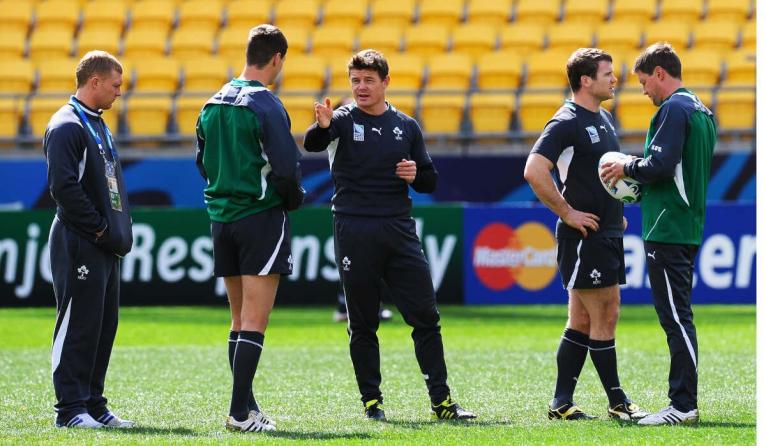
“You’re not allowed (onto the field),” Sexton said to O’Gara, as the Cork-man sought the kicking tee and the right to take the penalty. Not only did Sexton score that penalty; he also retreated back into his own half hoping Kidney would keep him on the field a little longer.
Things were thawing. They complemented each other publicly and when O’Gara replaced him against England in that year’s Six Nations, the pair hugged. All of a sudden their similarities – resilience, mental toughness – rather than just their differences caught people’s eye.
Then there was another unexpected twist. Sexton went to the 2011 World Cup as the established starter, but in New Zealand, his kicking let him down, allowing O’Gara wrestle the jersey back for the World Cup quarter-final.
Messing up at that World Cup remains painful. And it’s what driving him a couple of months out from his 37th birthday, that desire to keep going, to make up for 2011, a time when he admitted he took his ‘eye off the ball’.
“I wonder if I just took things for granted,” he told The Sunday Times in 2015. “I tried to be relaxed about it, tried to look at it as just another tournament. It’s not, really. It’s a World Cup and it only comes around once every four years. It’s your chance to do something on a world stage as a team and as a player. I just don’t want to look back and have regrets.”
Seven years on, that itch remains.
PART THREE – THE BROMANCE
Johnny Sexton needed Ronan O’Gara, a target to aim at, a talent to measure himself against; a set of statistics to try and emulate, then beat. And, for two years between 2013 and 2015, he needed him in a different sense.
When his IRFU contract ran out, Sexton had a choice. Two sets of figures were thrown at him, one by the Irish union; the other by the entrepreneurial owner of Racing 92, Jacky Lorenzetti. You don’t need to be an economist to work out who was going to make him rich.
Lorenzetti sold Sexton Paris and a dream. Except, the Paris Sexton got to see was a suburb circled by a ring road rather than the Champs-Élysées. If the locality lacked beauty then so did the rugby. Racing’s strategy was dour, based around a giant pack, limited in its scope.
Lorenzetti was thinking ahead, though. He’d forked out big money to land a No 10 from Ireland. Now, he’d no one to coach him. Scanning the marketplace, he came across a familiar name; Ronan O’Gara
He probably didn’t think too long over the news that Gonzalo Quesada, the former Argentina fly half, was leaving at the end of the 2012/13 season, given that he was still chasing a couple of trophies at Leinster when the story broke.
Lorenzetti was thinking ahead, though. He’d forked out big money to land a Number 10 from Ireland. Now, he’d no one to coach him. Scanning the marketplace, he came across a familiar name. O’Gara the player had made it clear he wanted to become O’Gara the coach.
In Unguarded, O’Gara’s second autobiography, he recounts the phone conversation that took place between the two rivals when he told him he was joining Racing: “Ah Jesus, I don’t believe it,” Sexton said to him. “So when I go playing for Ireland, you’re going to be playing for Racing. Is that what you’re telling me?”
In fact, he was telling him something different. O’Gara was going to teach him how to kick. You couldn’t have made it up.
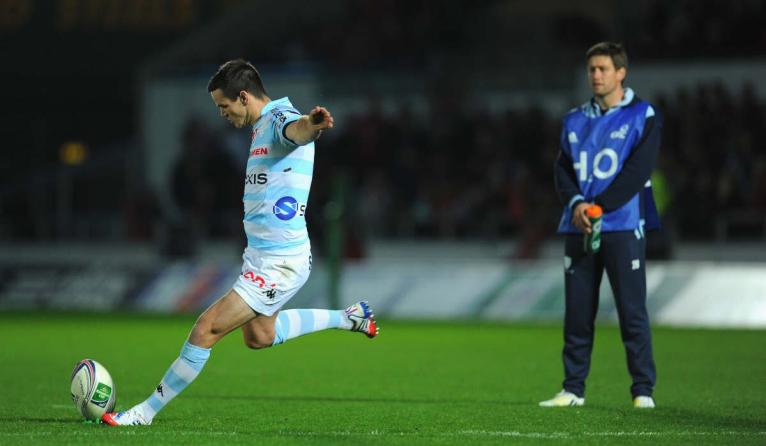
And the pair made up; Sexton and his wife regularly heading across to the O’Garas on Friday nights, where Rog and Johnny watched the Pro12 matches on TV; Laura Sexton and Jessica O’Gara equally glad of one another’s company.
“It’s great to have Rog there,” Sexton said at the end of his first season in Paris. “Will he be there next season? I don’t know. I hope so. I’d be scared to think about what it would be like if he wasn’t.”
Aside from entertaining Sexton in his sitting room, there was also chemistry on the training field.
“Sometimes it’s good to have someone, like a golfer has a caddie, to fix a line and stick with it. Once you have your line, you have no second thoughts. Rog now knows the trajectory of my kicks, how long the ball will travel before the wind might take it, or whatever.”
Pretty soon, though, it wasn’t just the ball that was travelling. After two years, Sexton was heading home while O’Gara began to move upwards in the coaching world.
PART FOUR – THE COACHES
From Paris, he and the family of five, would move on to Christchurch, where he helped the Crusaders win a couple of Super Rugby titles. Sexton, meanwhile, was also coaching …….. except doing so while wearing a Number 10 shirt on his back.
“In our first season at Racing, I messed up a play in training and Johnny came at me, aggressively,” Jamie Roberts said in a 2015 interview with The Sunday Times. “I’d not had an outside half speak to me like that before and it took some getting used to.
I just don’t think the guys at Racing used his brain enough. He craves control because he’s such a smart operator. His decision-making on the ball is what sets him apart
Jamie Roberts on Ronan O’Gara
“I just don’t think the guys at Racing used his brain enough. He craves control because he’s such a smart operator. His decision-making on the ball is what sets him apart. There aren’t many 10s who have that ability to compute risk so quickly and act accordingly.”
Being a 10 helped O’Gara transfer his skills, given how, as a player, he was the one ordered to execute a team’s game-plan and the one who had to react to the ebb and flow of a match.
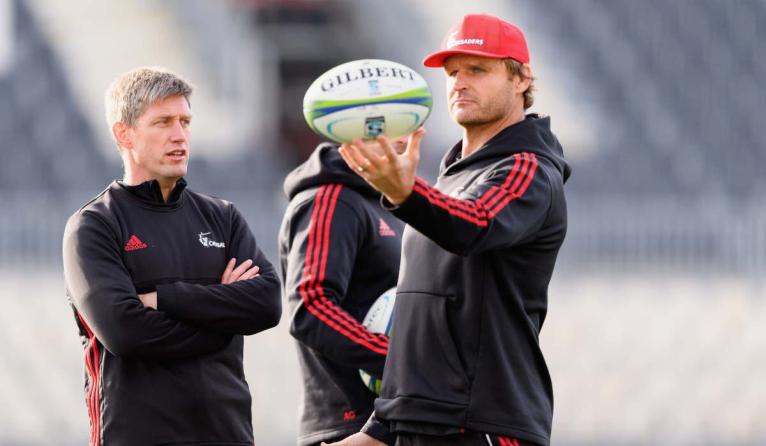
Making smart decisions marked him out as a fly-half and it has also served him well in his second rugby life. After two years in New Zealand, he decided, in 2020, to move back to France, choosing La Rochelle rather than Racing this time, because that was where the better opportunities lay.



Comments
Join free and tell us what you really think!
Sign up for free